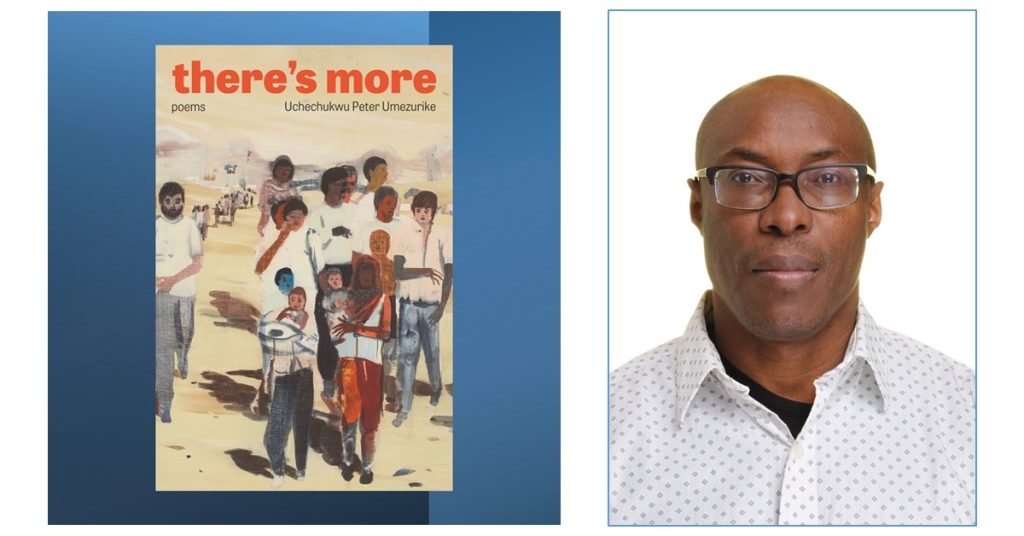Read on to find out why we are so excited about publishing Uchechukwu Peter Umezurike’s volume of poetry, there’s more.
And be sure to watch the video for Seagulls, which contains the stunning line about home being “anywhere we find something to love.”

Praise for there’s more by Uchechukwu Peter Umezurike
“In these memory-infused poems, home vanishes and reappears with moving suddenness: ‘down the stairs/of clouds,’ in the expression on a beloved face, in parks, in songs, in the bones. This work sweeps our gazes across oceans, cultures, and years to explore how our shared human yearnings—for belonging, for connection—persist in the soul. With a full heart and keen inquiry, Umezurike finds tender language for the ineffable sting of departure, the ache of remembrance.” —Kiki Petrosino, author of White Blood: A Lyric of Virginia
“Uchechukwu Peter Umezurike’s there’s more plumbs the grace of memory, the music of routes through stairs and scarves, silences and stares. Here language laces and weaves through the small pains which build, the quiet graces which relieve. Stories shift from the museum to the land to our eyes; each an aching momentary tender glimpse where, behind the words, there’s more.” —Derek Beaulieu, Banff Poet Laureate
“Palpating the soundscapes of memory from his homeland, Uchechukwu Peter Umezurike finds Nigeria returning in the wind against a window. The sense-suffused language becomes the homeland. Memories enter the rooms of his poetry in skillfully articulated images. Whether writing about the military dictatorship that existed in the 1990s or mourning the devastation of the Niger delta by drilling, the poet refuses silence. Uniquely, Umezurike’s dissent coexists with extraordinary tonal tenderness, as in ‘The Old Way,’ one of the best poems about nostalgia I have read. Rupture, heartbreak, hope, and efflorescence co-exist in Umezurike’s unguarded lyrics. His brilliance disarms the mind.” —Alina Stefanescu, author of Dor and Ribald
“In there’s more, the reader is rhythmically lulled into coming face to face with the realities of a world that centers the voices of the global majority. Through the shapes and words that dance on the page, we become enchanted by an exquisite cadence that takes us into the psyches of the dehumanized and the disenfranchised.” —V Mason-John, author of I Am Still Your Negro
“Uchechukwu Umezurike in there’s more plumbs the depths of human emotions by creating poems that are touching, stunning, powerful, brilliant, tender, and heart-rending at the same time. In his hands, a poem which is often a small, discrete thing, becomes an entire universe of words—novels, songs, treatises, and quiet declarations of rage. The reading of each poem causes my breath to be stilled, and I sit in wonder, and let the beauty, luminescence, and subtle sadness from these words caress my heart. ‘Home is What the Tortoise Bears on Its Back,’ is an example of Uchechukwu’s mastery. In a few lines the author conjures up mythic tales from the time before time, middle passages, civil wars, migrations, gardens of Eden, love stories, exile, hard life, a kick-ass attitude, and a necessary resilience. In there’s more Uchechukwu reveals that he is a poet of first rank.” —Afua Cooper, poet and author of Black Matters and “The Halifax Explosion“
“‘What is home if it’s a river,’ asks Uche Peter Umezurike, in his astonishing new collection, there’s more. The superb poems that inhabit these enchanted pages display the immigrant experience in a manner that is simultaneously vast and yet introspective, where ’a poem about home is the mother struggling with the shell on her back.’ This is a colourful, creative treatise on juxtaposition and place, where ‘the parade of pines’ and ‘the way snow climbs down the stairs of clouds’ mingles seamlessly ‘sharp and sweet as cloves’ with ‘the gnarled cotton tree where memories of old fathers water the roots.’ This is a world where udara trees, ravens, mangoes, bones, snow, and kola nuts find kinship with each other. Umezurike tantalizes with a skilled poet’s turn of phrase that is ‘precise like a smack.’ I am thrilled for this alluring and magnificent poetry collection.” —Michael Fraser, author of The Day-Breakers
“It is not only the soulful agonies of lost home, intimacy, people, and places, not only (to paraphrase the poet) the noiseless arrival of nostalgia that leaves a shroud behind, not only the angst of living in the exile of one’s own desires, in a place of one’s own escape from the ruins of home. It is not only the haunts of the memories of times past and present. The poems of there’s more touch even more on the very thing of human social life: the character of experience.” —Chigbo Arthur Anyaduba, author of The Postcolonial African Genocide Novel: Quests for Meaningfulness
